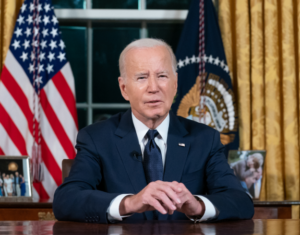The White House has said President Biden would veto the House Appropriations Committee’s (HAC) $833.1 billion fiscal year 2025 defense spending bill, citing objections to the bill’s divisive GOP-proposed policy provisions and cuts to the shipbuilding request.
Ahead of the House’s likely consideration of HAC’s Defense, State and Foreign Operations and Homeland Security spending legislation this week, the Biden administration has said it “strongly opposes” all three measures and criticized House Republicans for “again wasting time with partisan [appropriations] bills.”

“The administration strongly opposes the numerous policy provisions that, if enacted, would impede the department’s ability to implement the National Defense Strategy, support the nation’s service members and their families, harm long-term military readiness, and prevent the department from recruiting a total force representative of America’s diversity,” the White House wrote in a statement of administration policy released Monday.
The House Rules Committee is set to meet on Tuesday to debate which amendments will be allowed on the floor for consideration this week when the lower chamber takes up the three spending bills, with the Biden administration also noting it would veto the State and Foreign Ops and Homeland Security bills in their current form.
HAC on June 13 voted 34-25 along party lines to advance its $833.1 billion FY ‘25 defense spending bill out of committee, which followed debate on the lack of Ukraine aid in the legislation and Democrats’ objection to the inclusion of GOP-proposed “partisan social policy riders” (Defense Daily, June 13).
“Every member in this room knows what needs to happen for this bill to become law,” Rep. Betty McCollum (D-Minn.), ranking member on HAC’s defense subcommittee, said during the bill’s markup. “The partisan riders need to come out so the bill can get bipartisan support. It was deeply unfortunate we had to waste half of Fiscal Year 2024 to learn that lesson. Let’s take Churchill’s advice – learn from history – and not repeat the mistake in FY ‘25.”
The White House echoed McCollum’s view in its statement on Monday noting the bill’s inclusion of “numerous, partisan policy provisions with devastating consequences for the readiness and wellbeing of America’s military and their families” such as GOP-proposed provisions related to restricting access to reproductive healthcare services and blocking funds for diversity, equity and inclusion and $621 million for climate change-related initiatives.
The Biden administration also noted it “strongly opposes” HAC’s move to fund $761 million less for shipbuilding than was in the Navy’s budget request, to include eliminating two ship procurements.
HAC’s bill does align with the Navy’s budget request and includes procurement of only one Virginia-class attack submarine, whereas the House’s version of the National Defense Authorization Act supports procurement of a second platform, but does zero out funds for another planned Constellation-class frigate and cuts a Medium Landing Ship (LSM (Defense Daily, June 4).
While the Navy sought $268 million for one LSM, the committee’s bill report explained that it’s providing only $30 million “to allow for the program to focus on achieving design stability and solidify requirements before making contractual commitment that funds construction of the lead ship” (Defense Daily, June 12).
The White House also noted it opposes HAC’s $900 million cut in funds for DoD civilian personnel and the panel’s decision not to include a requested $300 million for the Ukraine Security Assistance Initiative (USAI), which is used to procure weapons aid to be transferred to Kyiv.
“This [$900 million] reduction would degrade the department’s ability to execute its mission and operations, adversely impact readiness, and negatively affect civilian recruitment and retention, a vital piece of the total force,” the Biden administration wrote. “Eliminating all USAI funding would undermine U.S. national security, undercut Ukraine’s ability to fight Russian aggression, and could cause Russia and other would-be aggressors around the world to question America’s commitment to a critical partner on the frontline of aggression.”